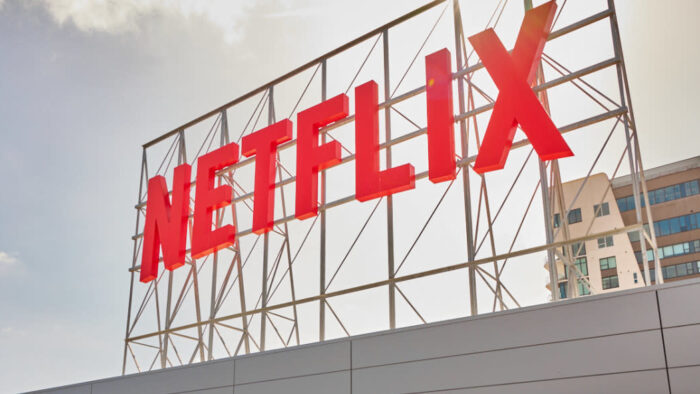ปี 2022 คาบเกี่ยวมาจนถึงต้นปี 2023 เป็นปีที่ Netflix เกิดการเปลี่ยนแปลงสำคัญหลายอย่าง (บทความเก่าที่เคยวิเคราะห์ Netflix เอาไว้) สิ่งที่ไม่เคยคิดว่าจะได้เห็น เราก็ได้เห็นกันแล้ว เช่น
- ขยายมาทำตลาดเกม ซื้อไลเซนส์เกม ซื้อสตูดิโอเกม ตั้งสตูดิโอเกม เพื่อนำมาเป็นส่วนหนึ่งของ subscription ให้มีมูลค่ามากขึ้น
- เพิ่มแพ็กเกจแบบมีโฆษณา เป็น tier ใหม่สำหรับจับตลาดลูกค้าที่มีกำลังจ่ายน้อยลง
- เริ่มไล่จับการแชร์บัญชี แชร์รหัสผ่านแล้ว หลังจากปล่อยๆ แอบหลับตามาตลอดหลายปี
- รูปแบบคอนเทนต์ใหม่ๆ ที่ไม่ใช่หนัง-ซีรีส์ เช่น ไลฟ์สด ฟิตเนส และอาจมีพวกกีฬาสด
เปิดปี 2023 มา เราก็เห็นจุดเปลี่ยนสำคัญคือ Reed Hastings ผู้ก่อตั้งบริษัท ลงจากตำแหน่ง CEO ไปเป็นประธานอย่างเดียว โดยตั้งผู้บริหารร่วม 2 คนเป็น Co-CEO แทนคือ Ted Sarandos และ Greg Peters
การลงจากตำแหน่งของ Reed ถือเป็นการผลัดใบครั้งสำคัญ และเป็นจุดเริ่มต้นของ Netflix ยุคใหม่ (ไม่รู้ว่าจะเรียกเลขอะไรดี แต่คงไม่ใช่ Netflix 2.0 เพราะถือว่าเปลี่ยนใหญ่มาแล้วรอบหนึ่ง ตอนย้ายจากดีวีดีมาเป็นสตรีมมิ่ง ขอใช้ชื่อ Netflix 2023 แล้วกันจะได้เหมือนเวอร์ชัน Windows)
ส่วน New Netflix จะมีหน้าตาเป็นอย่างไร แตกต่างจากเดิมแค่ไหนนั้น ใน Bloomberg มีบทสัมภาษณ์ Co-CEO ที่ให้รายละเอียดเชิงลึกมากพอสมควรในหลายประเด็น
ประเด็นเรื่องโครงสร้างบริหารแบบใหม่ ทำไมต้องมี CEO ร่วม? มันไม่น่าจะเวิร์ครึเปล่า?
ทั้งสองคนบอกว่าตามสถิติแล้วดีกว่าด้วยซ้ำ เพราะภาระงาน CEO มันหนัก หาคนแบ่งโหลดดีกว่า แต่ต้องเป็นคนที่เข้ากันได้ดี และ Reed ก็ยังอยู่ในฐานะประธานบอร์ด
Ted: That would be the conventional thinking, but nothing about Netflix has been very conventional.
Peters: We did look at the analysis and the co-CEO model outperforms. But you don’t see it that much because it’s unusual to find people who are willing to do the selfless part.
ธุรกิจสตรีมมิ่งปี 2023 (post-pandemic) ยังสดใสแค่ไหน
วิธีการตอบคือ อัตราการเติบโตของ subscriber นั้นไม่ได้โตอย่างที่คิด เลยต้องไปหา metric ตัวอื่นแทน ได้แก่ engagement, revenue, profit (พูดง่ายๆ คือหมดช่วง high growth แล้ว)
We’ve developed a business that is not growing as fast as we want it to, but is growing in the three things that matter the most: engagement, revenue, and profit.
ในอีกด้านคือเทียบการเติบโตของสตรีมมิ่ง กับขาลงของธุรกิจทีวีแบบดั้งเดิม และบอกว่ามีโอกาสเติบโตอีกมาก
The sector is growing dramatically and it’s growing on the demise of linear television.
Not all of US viewers are paying us right now. That’s a problem to be solved. We’re 8% of TV hours in the United States.
สิ่งที่ Netflix อยากจะเป็นคือ บริการครอบจักรวาลที่ตอบสนองผู้ชมได้ทุกเซกเตอร์ ครอบคลุมตลาดทั่วโลก ต่างไปจากสถานีทีวีแบบดั้งเดิม ที่มีจุดเด่นเฉพาะตัว จับกลุ่มผู้ชมเฉพาะทาง
The networks had identities and programming. We program into all those verticals, which gives us the ability to do quality at scale across every genre of entertainment and globally.
We are equal parts HBO, AMC, FX, the Food Network, HGTV and Comedy Central. Lifetime. You used to have to hunt through 500 channels of cable to find them all and now they’re gonna be on Netflix.
ตัวอย่างที่ยกมาคือ Squid Game รายการจากเกาหลีใต้ ที่จู่ๆ กลายมาเป็นปรากฏการณ์ฮิตทั่วโลกในอีก 30 ชั่วโมงให้หลัง โดยอาศัยพลังสเกลของ Netflix เท่านั้นที่ทำได้
It is very rare that a show like Squid Game from Korea would be as global as it was. Within 30 hours, the world was watching Squid Game with no human intervention to try to market Squid Game to the world.
เรื่องการยกเลิกรายการซีรีส์ของ Netflix ที่คนบ่นกันเยอะ
Ted บอกว่าจริงๆ แล้วยกเลิกแค่รายการที่ใช้เงินเยอะ แต่คนดูน้อย ถ้าเป็นรายการที่ลงทุนเยอะ+คนดูเยอะ หรือลงทุนน้อย+คนดูน้อย ก็ไม่มีปัญหา
We have never canceled a successful show. A lot of these shows were well-intended but talk to a very small audience on a very big budget. The key to it is you have to be able to talk to a small audience on a small budget and a large audience at a large budget. If you do that well, you can do that forever.
ทำไมถึงมาทำรายการสด
เพราะฟอร์แมตรายการแบบแข่งประกวด (competition) เหมาะกับรายการสดมากกว่า ถ้าเป็นรายการแห้ง คนมักกดข้ามไปดูตอนจบเลยว่าใครชนะ
A results show of a competition show is way better live. The one bummer of our competition shows, even the people who love them will skip to the last episode.
ทำไมถึงต้องมีแพ็กเกจแบบมีโฆษณา (Basic with ads)
เป็นกลุ่มลูกค้าอีกกลุ่มที่ไม่ซ้อนทับกับลูกค้าเดิม
Basic with ads is getting a healthy share in a way that says it is complementary to what’s going on with our overall plan set. Price sensitive customers.
ผู้ชมที่แชร์รหัสผ่านกัน จะทำอย่างไรกับคนกลุ่มนี้
คำตอบคือคนกลุ่มนี้ชอบดูรายการของเรา แต่เราจะหาวิธีทำให้คนกลุ่มนี้กลับมาจ่ายเงิน ซึ่งแต่ละคนมีเหตุผลที่ไม่จ่ายแตกต่างกันไป เช่น ไม่มีกำลังจ่าย ไม่ค่อยมี engagement มาก (อันนี้ไม่แน่ใจว่าแปลว่าอะไร)
Some of those folks are borrowing because they’re more price sensitive, they’re less engaged or whatever.
การบังคับให้จ่ายจะเกิดขึ้นแน่ แต่จะค่อยๆ ทำ ซึ่ง Co-CEO ก็ยอมรับว่าจะต้องมีคนบ่น มีคนวิจารณ์
This is a graduated approach, but the vast majority of people who are not paying for Netflix will have to pay for Netflix.
This is not gonna be a universally popular kind of event. There will be unhappy customers.
จำเป็นต้องซื้อสตูดิโอหนังอื่นๆ มาเพื่อเสริมคลังคอนเทนต์หรือไม่
คำตอบของคำถามนี้น่าสนใจมาก อย่างแรกคือตอบว่าการซื้อกิจการนั้น “ไม่คุ้ม” หากมองในแง่การซื้อคอนเทนต์เก่า
Acquisition might be a particularly economic inefficient way to get to that library.
นอกจากนี้ ยังวิจารณ์ค่ายหนังอื่นด้วยว่า โมเดลการที่ทุกคนทำสตรีมมิ่งเองมันไม่เวิร์คในเชิงตัวเลข และเราอาจเห็นบางค่ายหนังปรับโหมดกลับมาเป็นการขายไลเซนส์หนังให้สตรีมมิ่งอื่นแทน
And as the industry is sorting itself out, we might see that more folks have to shift into the arms dealer mode.
ค่ายหนังแบบดั้งเดิมที่มีหนังเก่าในคลังอยู่แล้ว ใช้วิธีขายไลเซนส์นั้นถูกต้องแล้ว แต่ Netflix ไม่เคยมีธุรกิจหนังแบบดั้งเดิมที่ต้องพิทักษ์รักษาเอาไว้ไม่ให้เจ๊ง โมเดลธุรกิจของ Netflix คือผ่าน subscription เท่านั้น
The best way for those guys to monetize that library is likely to license it. They’ve all built rich businesses selling their content to other people.
We’ve never had that as part of our business model. There’s no studio business that we’re trying to preserve. We do a better job of monetizing our content through our subscription model.
การที่ค่ายหนังอื่นๆ มีธุรกิจหนัง-ทีวีแบบดั้งเดิมที่อยู่ในช่วง “ขาลง” และกำลังเปลี่ยนผ่านมาสู่สตรีมมิ่ง ทำให้ Netflix ที่มีสตรีมมิ่งล้วนๆ อย่างเดียว ไม่มีภาระแบบเดียวกัน สิ่งที่ Netflix จะต้องทำคือเร่งเกียร์ในช่วงที่คู่แข่งกำลังลำบาก เพื่อทิ้งให้ไกลที่สุดต่างหาก
A lot of our traditional media competitors are working through a tough situation. They’ve gotta do the hard work of building sustainable streaming business. They’ve got legacy businesses that are not in great shape. Would we see consolidation out of that? I would not be surprised. We’re in a very stable position and our job is to basically sprint ahead run as fast as we can.

